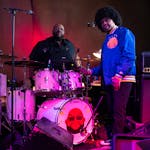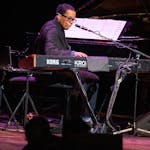His second movie, "Under the Cherry Moon," had just bombed at the box office. His engagement to singer Susannah Melvoin had ended. And Prince had dismissed his longtime backup band, the Revolution.
"You're turning 30, your reign has ended, the world is changing, the current styles of music are not what you do. And you've got this new band coming in," said Susan Rogers, his personal recording engineer from 1983 to 1987. "There was doubt in the room. Prince is not used to doubt. He didn't have the experience or the tool kit for understanding."
So Prince did what he always did — expressed his feelings in song. Lots and lots of songs.
In March 1987, exactly one year after trotting out the "Parade" LP, the international superstar delivered "Sign o' the Times." Rogers called it "a transitional album." Critics called the Purple One's ninth studio project his best album to date, superior to the blockbuster "Purple Rain."
The subject of a new super-deluxe reissue featuring 92 tracks, "Sign o' the Times" still holds up as the Minneapolis musician's masterwork 33 years later.
With its 16 original tunes, the wildly adventurous double disc embraced Prince's broadest musical palette, everything from new wave and gospel to funk and pop. Moreover, it proffered a wide range of messages, from entreaties to dance and incisive social commentary to sexy seductions of love and shout-outs to the Lord.
In this new reissue, dozens of previously unreleased tracks from his storied Paisley Park vault further illustrate his unstoppable explosion of creativity in this period.
"Sign o' the Times" was actually an outgrowth of several projects he recorded and shelved in the post-"Purple Rain" heyday — "Dream Factory," "Crystal Ball," "Black Album" and "Camille."
" 'Dream Factory' and 'Crystal Ball,' they were made out of leftovers," said Lisa Coleman, who played keyboards with Prince from 1980 to 1986. "He didn't really talk about the concepts. The songs would come first and then he'd decide where they should go."
In fact, 11 tracks on the original "Sign o' the Times" were written and first recorded with the Revolution.
Erasing Wendy & Lisa
After "Purple Rain," Revolution guitarist Wendy Melvoin (Susannah's twin sister) and Coleman — generally referred to as Wendy & Lisa — were integrally involved in coloring Prince's sounds.
With her classical training and jazz instincts, Coleman brought new harmonic flavors and different kinds of melodies — on keyboards and vocally. "I'd find those weird notes," she said, "and it always made him so happy."
Melvoin brought jazz and Brazilian influences. "Wendy could add hips to a record, but not the same hip or movement as soul and R&B," Rogers noted. "It was a Brazilian rolling side-to-side hips."
Wendy & Lisa "didn't want to be just his employees anymore," said Coleman, now an Emmy-winning soundtrack artist who still makes music with Melvoin. "As a trio, we were doing a lot of work on these songs, separately or together. I thought he was really happy and as prolific as ever."
However, on the Parade Tour in 1986, there was a lot of tension, especially at soundchecks. In the past, the Revolution would jam with Prince, but now he was inviting members of Sheila E.'s band, the opening act, to join him at these preshow rehearsals.
Said Coleman: "It almost became like a schoolyard — who you going to pick to be on your basketball team? He wasn't picking us all of a sudden."
After dismissing the Revolution as soon as the Parade Tour ended in September 1986, Prince wiped out all their "Sign o' the Times" contributions except for one track — concert number "It's Gonna Be a Beautiful Night"— and rerecorded them as a one-man band à la his first five studio albums.
When Prince submitted his new project to Warner Bros., it was a 22-song triple album — way too long for the label's top brass, who suggested an edited version. Overnight, Prince reconfigured his own 16-track, two-LP incarnation that became "Sign o' the Times."
'No time for depression'
"He wasn't inclined to wallow. He really had no time for depression or self-pity," said Rogers, who went on to earn a doctorate in psychology and now teaches at Berklee College of Music. She contributes an essay to the "Sign o' the Times" boxed set, as do Prince acolytes Lenny Kravitz and Dave Chappelle.
With no tour or movie in the works, the hyper-creative one-man band with an appetite for experimentation, novelty and any style of music was constantly recording. Sometimes more than one song per day.
Finished or not, the recordings would go into storage. If Prince wasn't particularly fond of a piece, he'd hold up three fingers to approximate a "W," Rogers recalled. "That meant weak. You take the Sharpie and write on the tape a big 'W' and circle it."
Even though he recorded a ton of material, "he didn't share a lot of stuff," said Matt Fink, aka Dr. Fink, one of Prince's keyboardists from 1978 to 1990. Of the nearly 100 pieces on the "Sign o' the Times," Fink reckons he's previously heard only 60% of the material.
The up-all-night superstar figured it was more efficient to play all the instruments himself rather than try to instruct his bandmates. So, his solo sessions might stretch beyond 24 hours.
Besides endurance, Prince displayed another quality — impatience. Rogers recalls how, in early 1986, he began recording "The Ballad of Dorothy Parker" before a newly built recording console was fully tested at his Chanhassen mansion.
The engineer didn't interrupt him, even though there was no high end on the console as they were recording. "His train of creativity moved so fast you just didn't want to pull that emergency brake," Rogers said.
"Dorothy Parker" sounded "like it's underwater. He just wouldn't stop," Rogers continued. Afterward, Prince opined, "I like this console. It's kind of dull." But the dull sound served the mood of the song.
Rogers noticed that on Sundays, Prince had a habit of recording spiritual songs, especially if he'd cut a vulgar tune the night before. Such was the case with "The Cross," a key track on "Sign o' the Times."
"I remember how happy he was afterward," she said. "The room seemed to go from dark to light when he finished that song."
Rogers recalls Prince fussing with the mix of "U Got the Look," his duet with Sheena Easton.
"He didn't normally spend that much time on a song. He was probably thinking this album doesn't have a lot of singles at this point."
Peaking at No. 2 on Billboard's Hot 100, the Prince-Easton collaboration was one of two smashes from "Sign o' the Times." The other was the title track, a social commentary about AIDS, gangs, guns, poverty, hunger, drug abuse, nuclear war, natural disasters and the Challenger space shuttle tragedy — his most prominent protest song, climbing to No. 3.
As 40-some previously unreleased studio tracks in the super-deluxe set indicate, Prince's mind was overflowing with ideas, including "Emotional Pump," which he penned for Joni Mitchell, who rejected it.
The new collection also contains three Prince recordings from the vault — originally intended for the Prince-created female ensemble Vanity 6 — that were offered in 1986 to Bonnie Raitt, but she passed on them.
New Year's Eve at Paisley
Even when Prince was on tour, his train of creativity couldn't be derailed. He worked up new songs at soundchecks that dragged on for two hours or more. Most arena headliners typically breeze through soundcheck in 20 to 30 minutes.
"He'd possibly change the show for that evening. I would record all that on a cassette boombox and also take notes," said Fink, the lone member of the Revolution who didn't get fired.
The band Prince assembled for the Sign o' the Times Tour in Europe, which featured drummer Sheila E., his protégée, was one of the greatest of Prince's many outstanding live bands. This unnamed group appeared in a November 1987 theatrical concert film, "Sign o' the Times," shot abroad and then largely reshot at Paisley Park, which had opened in September 1987.
The super-deluxe reissue includes double evidence of this jazzy, horn-buoyed funk band's live prowess — a recording of a Netherlands concert and a DVD of a special New Year's Eve show at Paisley Park, a $200-per-person, black-tie benefit for the Minnesota Coalition for the Homeless.
New bassist Levi Seacer Jr. didn't know what to expect that night from Prince, a sometimes jokester who promised a special guest. Five hours before hitting the stage, the newcomer was killing time at a piano at Paisley.
"I closed my eyes for a second, and I realized someone was sitting next to me. It was Miles Davis," Seacer reminisced. "I said, 'I'm not a piano player.' He says, 'Keep playing. Do you know there are no bad notes on a piano?' So, he starts playing these weird scales and stuff I wasn't used to hearing. 'See, there are no bad notes. It just matters how long you hang onto a note or not. I'll see you on the stage later.' "
Davis came onstage later during "It's Gonna Be a Beautiful Night." It was, indeed.
(The Prince estate will livestream the New Year's Eve show on its YouTube page at 7 p.m. Thursday.)






